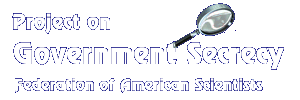 FAS |
Secrecy | 2004 News ||
Index |
Search |
Join FAS
FAS |
Secrecy | 2004 News ||
Index |
Search |
Join FAS

 |
|
|

Secrecy and Security News
Newer News: April 2004
March 2004
- A Clash on Classified Documents by Dana Priest, Washington Post, March 31 (free reg. req'd). "The Bush administration's uneven decision-making on which
sensitive documents it declassifies has prompted criticism that the White House is selectively releasing information to justify its foreign policy decisions and respond to political pressure."
- Who Vetted Clarke's Book? How the White House decided which tidbits were classified by Brendan I. Koerner, Slate, March 30. "Any government employee who requires access to classified intelligence information must first sign a nondisclosure agreement..."
- Nuclear Security Decisions Are Shrouded in
Secrecy by R. Jeffrey Smith, Washington Post, March 29 (free registration required). "Civil defense arrangements that were once the subject of mostly open rulemaking or debate are now often decided under a cloak of secrecy covering all but industry and government participants."
- Censored Study on Bioterror Doubts U.S. Preparedness by Judith Miller, New York Times, March 29. "Two years after a report on the 2001 anthrax attacks was completed, the Pentagon has released parts of the unclassified document, which concludes that the nation is woefully ill-prepared to detect and respond to a bioterrorist assault."
- Defense Panel Faults Nuclear Plans by Walter Pincus, Washington Post, March 28. "A prestigious Defense Department panel has recommended major changes to the United States' nuclear arsenal, saying the current plans to refurbish the existing weapons stockpile will not protect the nation from new threats from rogue states and terrorist groups."
- Pentagon Releases Redacted Version of Anthrax Lessons Learned Report, in response to FOIA request, March 15.
- Is Military Creeping Into Domestic Law Enforcement? by Robert Block and Gary Fields, Wall Street Journal, March 9. "In a little-noticed side effect of the war on terrorism, the military is edging toward a sensitive area that has been off-limits to it historically: domestic intelligence gathering and law enforcement."
- U.S. Lags in Recovering Fuel Suitable for Nuclear Arms by Joel Brinkley and William J. Broad, New York Times, March 7. "Government auditors have disclosed that the United States is making little effort to recover large quantities of weapons-grade uranium � enough to make roughly 1,000 nuclear bombs � that the government dispersed to 43 countries over the last several decades."
- HHS Will Lead Government-Wide Effort to Enhance Biosecurity in "Dual Use" Research, news release, March 4. "As a first step in this process, Secretary Thompson announced the creation of the National Science Advisory Board for Biosecurity (NSABB). The new board will advise all federal departments and agencies that conduct or support life sciences research that could fall into the 'dual use' category."
Older News: February 2004
 FAS |
Secrecy |
2004 News ||
Index |
Search |
Join FAS
FAS |
Secrecy |
2004 News ||
Index |
Search |
Join FAS
 http://www.fas.org/sgp/news/2004/03/index.html
http://www.fas.org/sgp/news/2004/03/index.html
 Maintained by Steven Aftergood
Maintained by Steven Aftergood



